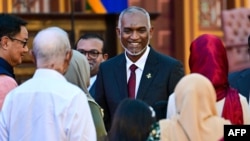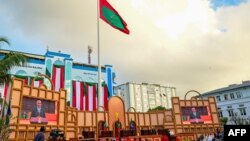The new president of Maldives, Mohamed Muizzu, has moved swiftly to implement a campaign pledge to remove India’s military presence in his country by officially asking New Delhi to withdraw its military personnel from the Indian Ocean archipelago.
His administration has also said it is reviewing more than 100 agreements signed with India, including some in areas of defense and security.
Analysts call it a setback to India’s efforts to counter China’s influence in the small, strategically located country to its south as Muizzu, seen as a pro-China leader, is likely to lean toward Beijing.
While New Delhi’s ties with Male, the capital of Maldives, grew significantly during the previous administration, that of former President Ibrahim Mohamed Solih, which followed an "India First" policy, Muizzu campaigned on an "India Out" platform, saying that the Indian military presence in the country compromised Maldivian sovereignty.
The 77 military personnel whom Muizzu wants India to take back are mainly pilots, crew and technicians who operate two helicopters and an aircraft used to assist the island nation in maritime surveillance, search and rescue operations and medical evacuations.
But in Maldives, the presence of the men during the election campaign was perceived as "boots on the ground."
"The way the issue was portrayed during the election, it seemed there was a strong Indian military presence in the country. That could have played into popular sentiments," said Azim Zahir, a research fellow at the University of Western Australia and Maldivian analyst.
"But this was not really the case," he said, "After they came to power, they released the figure and it was just about 77 personnel."
The last decade has witnessed a geopolitical tug of war between India and China for a strategic presence in the Maldives, similar to that seen in such other South Asian countries as Sri Lanka. These island countries straddle vital sea routes through which much of the oil from Middle Eastern countries heads to South, Southeast, and East Asia.
China established a significant presence in the Maldives from 2013-18 when it moved closer to Beijing and joined its Belt and Road Initiative. Among China’s biggest projects is a $200 million four-lane bridge connecting Male with the international airport, which is on a different island.
New Delhi’s influence expanded in the last five years under the pro-India Solih administration that lost power in the September elections. The polls were called a virtual referendum on which of the two Asian countries would have greater sway in the Maldives.
Muizzu, though, said at his inauguration that he will "draw lines of independence and sovereignty very clearly."
"I will keep friendships with foreign countries. There won’t be any enmity, with countries close and far away," according to Muizzu. He has also said he will seek stronger investment ties with both India and China.
Analysts in New Delhi say it remains to be seen how Muizzu will navigate his relations between the two Asian countries that are bitter rivals.
"We will have to wait and watch whether he leans one way or the other. While he is seen as pro-China, I think he will have to take India’s sensitivities into account," Harsh Pant, vice president of studies and foreign policy at the Observer Research Foundation said.
"Countries like Maldives have become very important at a time when contestation between great powers is becoming very vivid in the Indian Ocean region," he said.
In a sign of the growing geostrategic importance of Maldives, the United States opened an embassy in Male in September and Australia opened a high commission in May.
"The decision of the new president to evict Indian military personnel is a setback to not just India but also the Quad countries," according to Chintamani Mahapatra, founder of the Kalinga Institute of Indo-Pacific Studies in New Delhi. "These countries wanted Maldives to participate in their effort to maintain peace and stability in the Indo-Pacific region."
The Quad grouping – Australia, India, Japan and the United States – aims to counter China in the Indian Ocean and Pacific region.
For China, close ties with the Maldives could help expand its reach further in the Indian Ocean, said Mahapatra.
Analysts say it is not clear what direction Muizzu’s foreign policy will take.
"He will definitely seek more Chinese economic assistance, no doubt about that, but that does not mean that at a strategic level Maldives will become closer to China to the detriment of India," according to Zahir. "However, New Delhi will have to concede his key demand of withdrawing its military personnel."
Analysts say India will wait to see how the new administration’s policies unfold.
New Delhi and Male have agreed to discuss "workable solutions" to continue the use of India’s helicopters and aircraft following a meeting last Saturday between Muizzu and India's minister of earth sciences, Kiren Rijiju, in Male, according to the Press Trust of India. New Delhi has said that in the last five years, its military personnel carried out more than 500 evacuations.
"India cannot ignore Maldives, that is a given. But Maldives also cannot ignore India. India will see how this balance is struck by the new government which may have come to office on a pro-China sentiment, but which will have to take into account realities on the ground when it governs," according to Pant.





